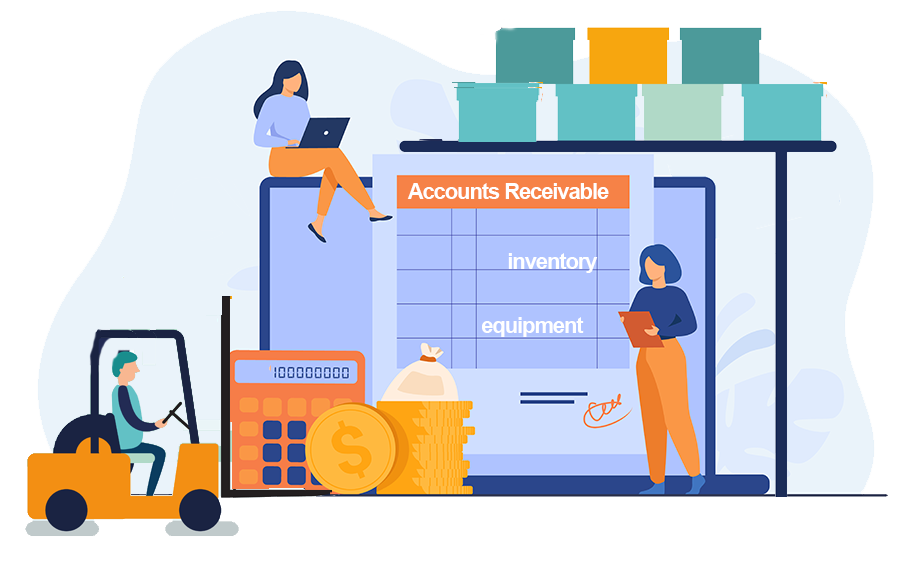Asset-Based Lending
Secure ABL Options, Quickly
Asset-Based Lending for your business. Find your perfect ABL options $2MM-$100MM.

Finding the Right Asset-Based Lending Options for Your Business
Asset-Based Loans, also known as ABLs, provide working capital and liquidity based on fixed assets. Asset-Based Lending loan structures of are typically in the form of a revolving lines of credit (LOC). There are various asset classes that lenders can underwrite and they include:

Machinery & Equipment
M&E loans are some of the easiest to finance given the relative ease to assign a value to the assets. Lenders will appraise the equipment and the loan size will be determined by the loan to value (LTV) ratio.

Accounts Receivables
Eligible AR is computed by the lender and an advance rate is applied to the revolving pool. Eligibility of AR is determined by the billed vs unbilled status and how long the AR is outstanding. Advance Rates: 70-90%

Inventory
Lenders will determine a net orderly liquidation value (NOLV) of the inventory and provide and advance rate against this value. Advance rates will vary depending on the type of inventory (ie, raw materials, finished goods, customized products, etc). Avg. Advance Rates: 50-65% of NOLV

Real Estate
Lenders will order an appraisal on the real estate and use the loan to value ratio to determine loan size. Many lenders prefer owner-occupied real estate -- RE in which the operating business both owns the real estate and operates from that same location.

Purchase Orders
POs are considered an asset for some non-bank asset-based lenders. They can provide an advance rate against the purchase order value assuming the customers are large creditworthy businesses.

Intellectual Property
In some cases the IP of a company can be considered an asset. While this is less common and more unique, there are lenders who will assess the litigation value of the IP portfolio and a loan against those assets.
Some companies may be eligible to receive a combination of the asset-based lending structures and possibly receive these in combination with a cash flow loan. Ultimately the structure of your credit facilities is more important than even the interest rate as the structure can dramatically impact the flexibility the company has in taking on growth initiatives. Ensure you are considering all your structure options by scheduling a call with our expert team.
Secure Better Rates & Terms for Asset-Based Loans
2200+
lending institutions
48hrs
to receive lender interest
41%
avg. reduction in fees
*These are averages, calculated from current and past Cerebro Capital clients.
What Type of Asset-Based Loans do Lending Institutions Offer?

Commercial Bank Asset-Based Loans
For clients in a strong financial position a commercial bank's ABL group can provide attractive rates. Fees are typically minimal but they will require some basic reporting and covenant requirements. Note, that not every commercial bank has an ABL group and not every commercial bank relationship manager is familiar with asset-based loan structures.

Non-Bank Asset-Based Loans
Non-bank lenders are considered more flexible than a traditional commercial banks and can typically provide a larger advance rate resulting in a larger loan. A non-bank might be a better fit for a company if there is: significant growth, high customer concentrations, seasonality, low tangible net worth or when additional capacity is needed beyond a commercial bank line.

Factoring
Factoring offers an entirely different loan product and is typically reserved for companies that cannot qualify for commercial bank or non-bank asset-based loans.
Asset-based loan structures are ideal for companies that have any single balance sheet item totaling over $1,000,000. Try our Debt Capacity Calculator to calculate how much your business may be able to borrow.
Frequently Asked Questions - Asset-Based Lending
What if I don't have a positive cash flow? Is an asset-based lending an option?
Yes! Non-bank lenders are mostly concerned with the collateral value of the assets rather than the cash flow of the business. This means that many companies who have little to no cash flow but a strong balance sheet can often get a higher loan amount through an asset-based loan structure.
Do asset-based lenders require a senior secured position?
Usually, yes. Lenders will file a UCC-1 on the assets so they are in the first lien position on most assets (usually all assets except Real Estate). Other non-real estate lenders will need to be in a subordinated position behind the asset-based lender.
What are the audit requirements for asset-based lenders?
An on-site audit would be needed if the collateral is inventory, machinery & equipment, or real estate. Other types of loans like account receivables may or may not require an on-site audit and it will be up to the lender to determine.
The best way to know what asset-based loan options are available to you, is to complete a loan request.
Ready to get started?
Join the thousands of mid-sized companies who have used Cerebro.
- info@cerebrocapital.com
-
12 W Madison St.
Baltimore, MD 21201 - Cerebro Capital
- @cerebrocapital




